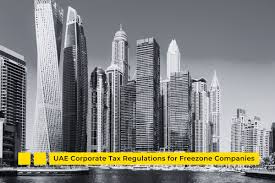The introduction of a corporate tax in the United Arab Emirates
The United Arab Emirates (UAE) is a global center for business and finance. The strategic implementation of the laws in the country has attracted a large number of investors over the years, who now have long-standing businesses in the region. To make the country even more business-friendly, the UAE will introduce a new corporate tax system from January 1, 2024.
The new tax system is based on internationally recognized practices and the principles of fairness and justice. It will help further boost investments and strengthen the UAE’s competitiveness in the global market.

What is corporate tax?
Corporate tax is a direct tax levied on the income of companies. Companies subject to corporate tax are usually either resident in the country or operate on income generated in that country.
The new corporate tax in the UAE
The new corporate tax in the UAE applies to individuals based in the UAE who provide consultancy, freelance or other business services to local and international companies and have an annual income of AED 1 million or more (approximately £215,000) with a minimum of AED 375,000 generate profits from this income.
Tax liability starts from a profit of AED 375,000. The tax rate is 9% on profits exceeding AED 375,000. This means that a freelancer can benefit from the 0% tax rate on the first AED 375,000 of taxable income.
Who is liable to pay taxes?
According to the new corporate tax law, the following persons are liable to tax:
- Residents:
- Legal entities registered, incorporated or legally recognized in a country or free trade zone
- Legal entities incorporated, incorporated or recognized by the legislation of a foreign jurisdiction administered by the country
Natural persons doing business in the country
- Persons designated by a cabinet decisionForeigner:
- Persons who have a permanent establishment in the country in accordance with Article 14 of the Law
- Persons receiving income from the country in accordance with Article 13 of the Law
- Persons who have a connection within the country, as determined by a Cabinet decision
outlook
The introduction of corporate tax in the UAE is an important step towards strengthening the country’s economic environment. The new tax system will help further boost investment and make the UAE an even more attractive location for businesses.
How will corporate tax be collected in the UAE
from June 1, 2024?
Corporate tax in the UAE will be implemented from June 1, 2024. Companies covered by the Act are liable to tax from the financial year beginning on or after that date.
The corporate tax threshold is AED 375,000. Companies with income up to AED 375,000 or less are subject to a 0% tax rate. Companies with an income of more than AED 375,000 are subject to a tax rate of 9%.
The tax rate for large multinational companies that meet certain criteria under “Pillar 2” of the OECD Base Erosion and Profit Shifting Project has not yet been set.
The Federal Tax Authority (FTA) is responsible for administering the corporate tax system.
Exceptions to the corporate tax law
Article 4 of the new law lists the persons exempt from the tax regime:
- Government-owned or government-controlled entities
- Persons engaged in extractive or non-extractive business as specified in the law
- Qualified nonprofit entities and qualified investment funds
- Public pension and social security funds
- It should be noted that exemptions can only be claimed if the requirements specified in the law are met. If a natural or legal person does not meet the necessary conditions, he or she ceases to be an exempt person in accordance with Article 4(5) of the Law.
In addition, the following income is not subject to corporate tax:
- Dividends and profits earned by a legal entity resident in the UAE
- Dividends and profits from an interest in a foreign legal entity or pursuant to Article 23 of the Law
- Income from a foreign public institution
- Income of a foreign person from the operation of aircraft and ships in international traffic
Information for companies
- Companies operating in the UAE should familiarize themselves with the new corporate tax regulations. The FTA provides information and resources on its website to help businesses meet their tax obligations.
- Businesses should also note that each emirate has its own trading and tax rules. It is important to familiarize yourself with the specific regulations of the particular emirate in which a company operates.
conclusion
- The introduction of corporate tax in the UAE is a significant change for companies operating in the UAE. Companies should familiarize themselves with the new regulations and contact the FTA if they have any questions or need assistance.
The key features of the new UAE corporate tax law are as follows:
- Introduction of a corporate tax with a basic rate of 9% for companies with an income of more than AED 375,000.
- Applying the arm’s length principle to transactions and agreements between related parties.
- Permission to form tax groups, provided they meet the conditions set out in Article 40 of the Law.
- Deductions for certain expenses and relief in calculating taxable income.
- Rules regarding profit and loss transfers, applications for registration and de-registration, calculation and filing of tax returns and refunds.
These features are of great importance for companies operating in the UAE. The introduction of corporate tax is a significant change for the UAE tax system and is likely to impact the financial planning and competitive position of companies in the country.
The introduction of the arm’s length principle is an important step in combating base erosion and profit shifting. This principle states that the prices of transactions between related parties should be as if they had been agreed between independent parties. This is to ensure that UAE companies pay their fair share of taxes.
The ability to form tax groups can be beneficial for certain companies. Tax groups can combine their taxable income and losses, which can lead to tax savings. Deductions for certain expenses and relief can also lead to tax savings. Examples of possible deductions include expenses for research and development, investments and donations.
The rules on profit and loss transfers, applications for registration and de-registration, calculation and filing of tax returns and refunds are important for compliance with the new corporate tax regulations.
Keep in mind that UAE corporate tax is still in its early stages and adjustments and clarifications may occur in the future. However, by staying informed and taking proactive measures, you can ensure your UAE freelance business thrives under the new tax regime.
The decision to locate a business in Dubai is an important decision that should be carefully considered. Corporate tax is just one factor that companies should consider when making their decision. Other factors include:
- The cost of living and doing business in Dubai.
- The legal and regulatory framework in Dubai.
- The availability of skilled labor in Dubai.
- The opportunities for growth and development in Dubai.
Companies should also research other jurisdictions in which they can locate their business. There are many countries and regions with low or even zero corporate taxes. Companies should carefully review the tax regulations of these countries to ensure that they offer the best tax options for them.
Businesses should also be aware that tax laws are constantly changing. It is important to keep up to date with the latest developments in the tax laws of the countries and regions in which they operate.
——————–
TCME – Group worldwide is a leading professional international foreign trade relations investment and consulting firm, with 17 different departments spread in different countries around the world, with its head office in Malaysia.
We’ve helped thousands of people take their businesses abroad, legally reduce their taxes, and become dual citizens. We focus on high-net-worth individuals and their families as well as businesses, where we design and implement bespoke, holistic strategies for successful investors and entrepreneurs to legally reduce their tax burden, diversify and protect their wealth, invest abroad, a second citizenship and to live a freer life worldwide.
Another special area of our full-service consulting is the investment opportunity and solution in Europe, especially in the Balkans, Africa, Asia, the United Arab Emirates, the Caribbean and the Pacific.
Our legal team and our 200+ multi-disciplinary team have more than 25 years of global experience in the different Consulting Areas. Governments as well as the super-rich trust in our expertise in consulting. If you are looking for it, please feel free to contact us. We create a holistic plan that serves your purpose.
YOUR CHANCE FOR A BETTER LIFE
Our range of services includes:
- Offshore and Onshore Company Formation,
- executive Search,
- IT & Cyber Security Protection
- international Business & Management Consulting
- Citizenship & Residency
- Investments & Corporate Financing
- Mining and Trading
- Advisory for Foreign Economic Relationship
- Diplomatic Consultancy & Public Affairs
If you would like to discuss your internationalization and diversification plans, book a consulting session* or email us under: [email protected]
*A counseling session is a conversation about your portfolio and goals. It does not constitute legal, financial, tax or investment advice.
TCME Worldwide Group – Global Investments –
Level 33, Ilham Tower, 8 Jalan Binjai,
Kuala Lumpur 50450, Malaysia
www.tcme.company
www.citizenship-news.com
Phone: +66 99091 8357 also for WhatsApp





